Published September 13, 2023

A Tale of Three Cities: NYU’s Summer Creative Writing Programs
Staff Writer
- Aspiring writers can spend a month honing their craft in Paris, Florence, or New York City.
- These summer programs are open to current NYU undergrads as well as visiting students.
- Writers immerse themselves in their cities and learn from leading literary and creative minds.
Writers draw inspiration from their own experiences, and for many, global cities become their muse. At NYU, aspiring poets, fiction writers, and creative nonfiction writers can enroll in a monthlong immersive summer program through the College of Arts and Science . Participants choose between Paris, Florence, and New York City, and then hone their creative writing skills against the backdrop of an iconic city. Below, three aspiring wordsmiths share their experiences living a writer’s life.
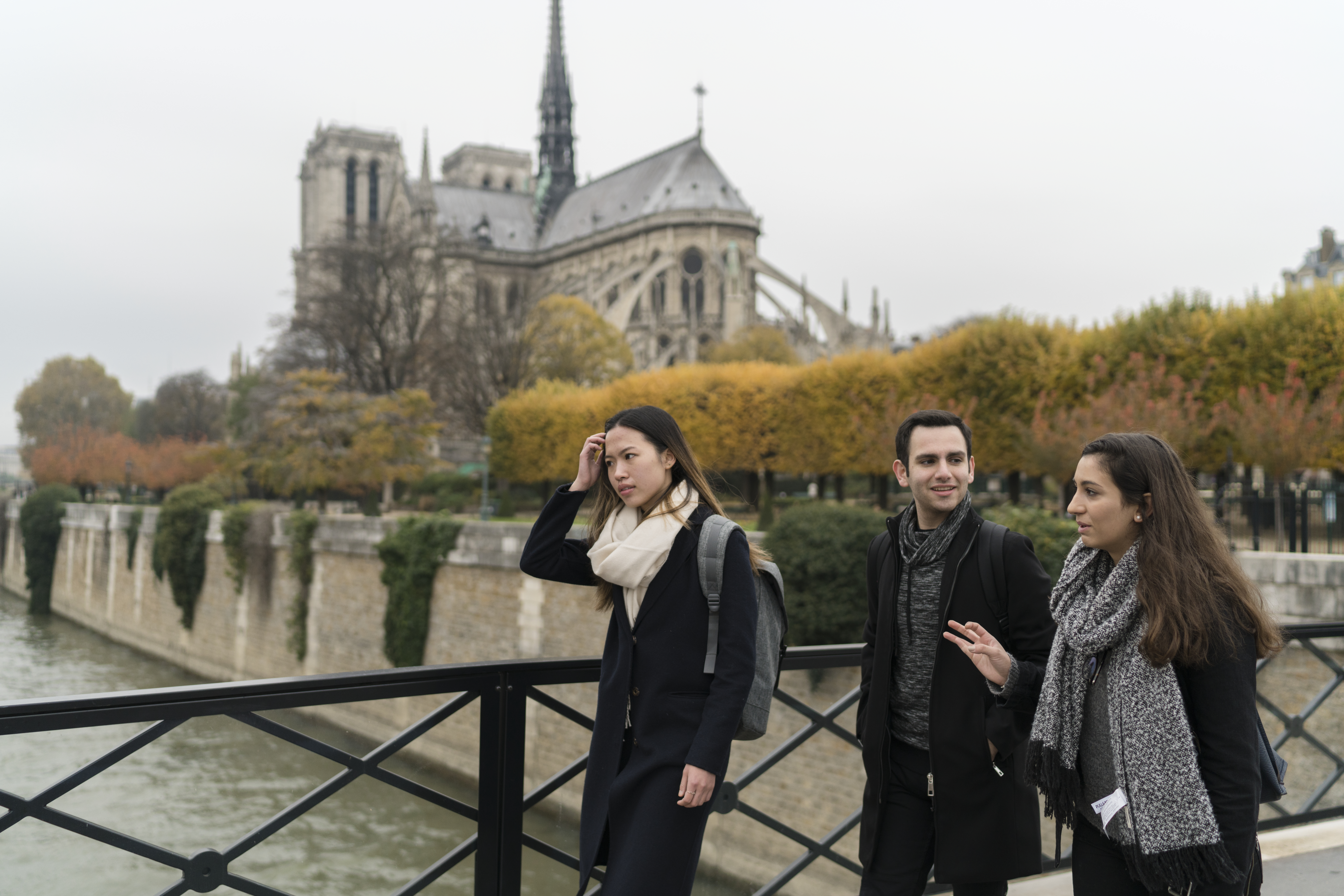
Enjoy a Moveable Feast in Paris
NYU English and American Literature major Isean Bhalla chose to study in Paris because a friend completed the program and loved it. Their endorsement? “‘It was the greatest month of my life,’ word for word,” Isean recalls. “Plus, one does not say no to Paris. Ever.” Reflecting back, Isean credits growing as a creative writer to the program’s high-quality faculty and “excellent” nightly readings from “world-class writers.” “It gave me a greater understanding of my own voice as well as things I want to write about in the future,” Isean affirms.
Most importantly, however, Writers in Paris connected Isean to an inspiring community that was rich in writing talent and friendship. “The program put me in constant contact with other writers who were better than I was. They pushed me in ways I couldn’t. Being around writers 24/7 doesn’t sound like it’s that important, but I found it more stimulating for my writing than anything else. That’s all anyone ever talked about or thought about. So we’d feed off each other and get better.” And, of course, being in Paris didn’t hurt. Isean says, “Paris is a muse; Paris has always been a muse; and I suspect Paris will always be a muse.”

Get a Room with a View in Florence
Katherine Ertman always considered writing a hobby, but after attending Writers in Florence , she realized it could be a career. The NYU Vocal Performance major is training to be an opera singer, but in Florence, she found that “writing my own stories instead of performing stories written by others was a refreshing experience.” In fact, Katherine spent the past summer completing a Creative Writing minor by enrolling in both Writers in Florence and Writers in Paris. “It seemed like an amazing opportunity to complete all 16 credits while exploring two inspiring European cities,” she explains.
In Florence Katherine drew inspiration from a day trip to Castello di Fosdinovo, a Tuscan medieval castle. In Paris she attended readings by renowned authors outside the iconic Shakespeare and Company bookstore. “The locations really influenced me, and I ended up writing a few stories set in both locations,” Katherine says. In the end, she urges anyone interested to enroll, even if they’ve never shared their creative writing with others. “Just try it!” she exclaims. “Writing was a hobby for me, and I went in without any prior workshop experience. Also, I was intimidated because I’m not an English major. However, my fears were unfounded because the faculty and students alike were so supportive. It’s an experience I wouldn’t trade for the world.”
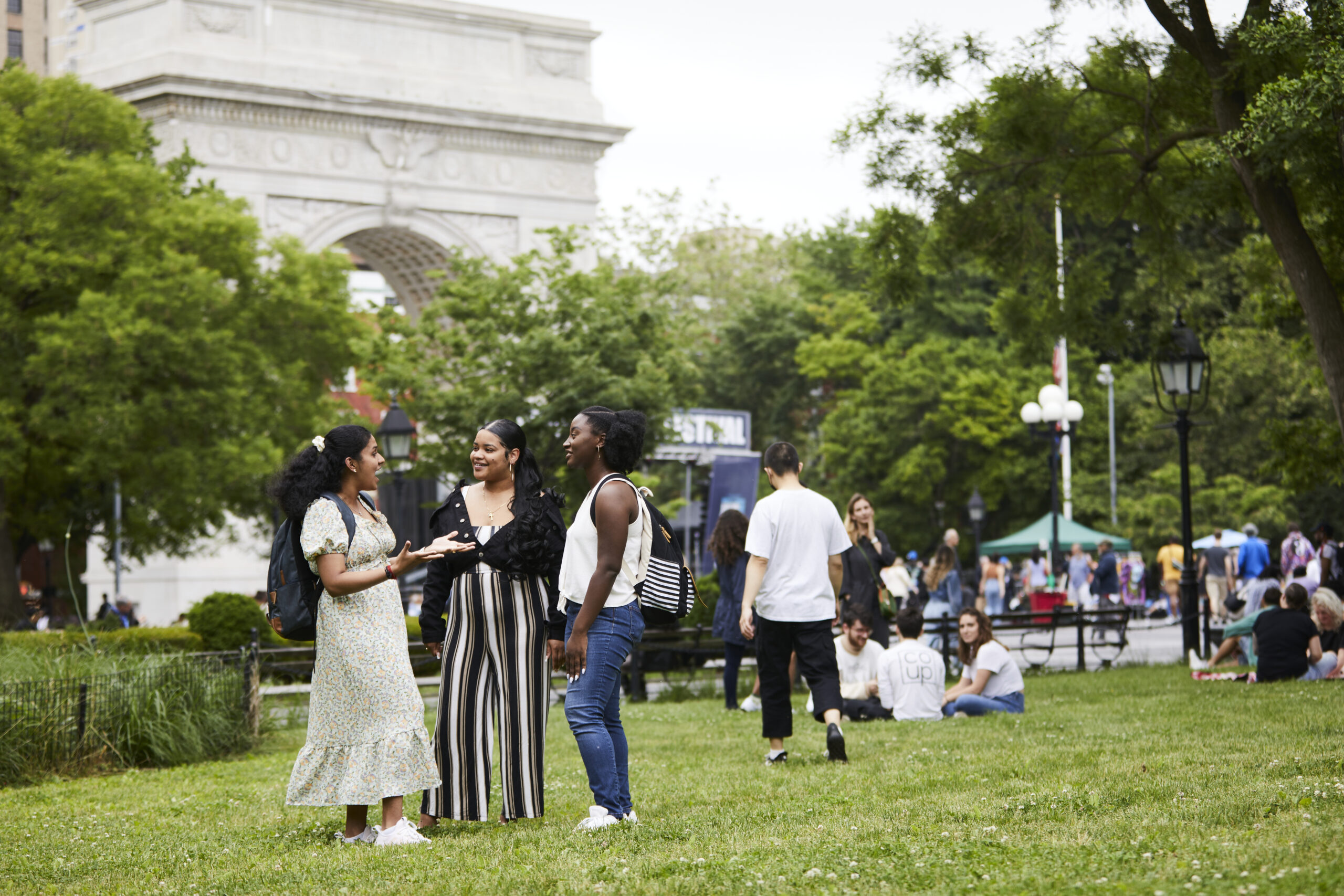
A Writer Grows in New York City
Esmé Warmuth grew up close to New York City, admiring the city from afar but never spending much time there. So when the English major learned that she could join NYU’s Writers in New York program as a visiting student , she jumped at the chance. “I’ve been a longtime admirer of NYU’s creative writing faculty,” she adds. Living in Greenwich Village, Esmé connected with published authors, literary agents, and magazine editors, gaining valuable professional experience. She particularly enjoyed a panel with program alumni. “It was helpful to hear from authors who had started where we were and wound up with book deals, jobs teaching creative writing, and overall successful careers,” she explains.
During her month in New York City, Esmé sharpened her skills as a writer and gained confidence in her abilities. “Receiving, giving, and listening to advice in class helped me grow my craft and gave me the opportunity to share my writing with a receptive and positive audience,” she says. All in all, the experience was better than she could have imagined. “The Writers in New York program was like nothing I ever experienced before,” she concludes. “Being among students my age who were just as passionate about books and writing as I am was wonderful. Plus, everyone came in with a great attitude and a willingness to learn. I’m very grateful.”
A Creative Writing Minor Complements Any Major
Across majors and around the world, NYU students find the value in a Creative Writing minor.
A Guide to Writing Majors at NYU
At NYU, English and creative writing aren’t the only options for aspiring writers!
Find Joie de Vivre at NYU Paris
At NYU Paris, you can practice your French, take courses at local institutions, and soak in the French capital’s storied culture.
- Search Close Search
- Career Edge - NYU High School Summer Program
Creative Writing
- Share through Email
- Share through SMS
This summer, immerse yourself in the craft of creative writing with fellow young authors in a pre-college environment. Learn from an industry expert as you transform your ideas and stories into compelling writing. Develop the techniques that are fundamental to all types of fiction writing—literary fiction, dystopian fantasies, fairy tales, and mysteries—and refine your skills in story structure, character development, description, and dialogue. Students will also experience lectures, interact with noted authors, and receive information on how to turn your passion into a career. Gain exposure to workshopping your writing with constructive feedback, ultimately walking away with a variety of short creative pieces ranging from poems, stories, and scenes, to collage texts and flash fiction.
- High school students who have completed grades 9, 10, or 11
- High school students interested in strengthening creative writing skills
You'll Walk Away With
- Refinement of your creative writing, including narrative arc, world-building, authentic dialogue, and character development
- A portfolio of peer-critiqued short stories
- An NYU transcript showing grade(s) earned upon completion of the course (Please note: No college credit or certificate of completion is granted for this course.)
Available Sessions
- Session 3 Jul 15 - 19, 2024 Mon - Fri 09:00 AM - 05:00 PM
- Session 4 Jul 22 - 26, 2024 Mon - Fri 09:00 AM - 05:00 PM
- Session 6 Aug 05 - 09, 2024 Mon - Fri 09:00 AM - 05:00 PM
Information Table
Students from around the world attend NYU summer programs, but only a college prep program like High School Academy provides the opportunity to explore both traditional and emerging career paths.
Projects and short assignments provide take-aways that prepare you for college classroom work, while demonstrating your newly acquired skills.
Career Edge Schedule
Start Date: June 24, 2024 End Date: June 28, 2024
Start Date: July 8, 2024 End Date: July 12, 2024
Start Date: July 15, 2024 End Date: July 19, 2024
Start Date: July 22, 2024 End Date: July 26, 2024
Start Date: July 29, 2024 End Date: August 2, 2024
Start Date: August 5, 2024 End Date: August 9, 2024
International Student Deadline: March 15, 2024 Residential U.S Student Deadline: May 17, 2024 Commuter U.S Student Deadline: June 7, 2024
Application Requirements and Fees
To apply you must have successfully completed grades 9,10, or 11. You must submit the online application, a 250-500 word essay, and an official high school transcript. Essay Topic: Please describe why you would like to take your selected course(s). Please include any previous courses you've taken in this subject or previous experiences with this subject. Give more detail as to why you would like to take this course over the summer. Your response should be 250-500 words total. If selecting multiple courses, please contain all responses to a single essay.
Fees for Summer 2024
Application Fee: $50 (non-refundable) Tuition: $2,579 per course Housing & Dining Fees (add on): $618 per week Please note: No financial aid, scholarships, or discounts are available for Career Edge
For International Students
Resources and visa information for international students interested in studying abroad in NYC
Program Contact
212-998-7006 - [email protected]
Admitted Students
Resources for students who have been admitted to the program
- Skip to Main
- Master's Programs
- Ph.D. Programs
- Global & Online Programs
- Library and Information Science Dual - Degree Program
- Certificate Programs
- Application Resource Center
- Financial Aid
- Admissions Events
- Campus Tours
- Newly-Admitted Students
- Message from the GSAS Dean
- Academic Calendar
- Inter-University Doctoral Consortium
- Submitting Your Dissertation
- Fellowships and Awards
- Fellowships & Awards
- Alumni Features
- Public Humanities Initiative
- New Student Orientation
- GSAS Convocation
- The Master's College
- Diversity, Equity, and Inclusion
- OASA Room Reservations
- Graduate Student Council
- Graduate Student Clubs
- Student Resources
- Doctoral Alumni Association
- Senior Administration
- Dean's Office
- Policies and Procedures
- Directors of Graduate Studies & Program Directors
- Standing Committees
- History of GSAS
- Dean's Conference Room
- Administrative Resources
- Dean's Advisory Council
- Research in GSAS
- Give to GSAS
- NYU/Axinn Foundation Prize
- Event Calendar
- TELL GSAS Doctoral Research Days
Creative Writing
Degrees and fields of study.
- M.F.A. in Creative Writing - Fiction
- M.F.A. in Creative Writing - Poetry
- M.F.A. in Creative Writing - Creative Nonfiction
- M.F.A. in Low Residency Writers Workshop in Paris Program - Fiction
- M.F.A. in Low Residency Writers Workshop in Paris Program - Poetry
- M.F.A. in Low Residency Writers Workshop in Paris Program - Creative Nonfiction
Application Deadlines
Applications and all supporting materials must be submitted online by 5PM Eastern Time. If a listed deadline falls on a Saturday, Sunday, or U.S. federal holiday, then the next business day will be the actual deadline.
Creative Writing Programs
- December 18 : Fall admission
Writers Workshop in Paris Programs
- September 1 : January residency (January term application)
- February 1 : June residency (summer application)
Requirements
In addition to the general application requirements, the department specifically requires:
Test Scores
- Please do not send GRE test scores — they will not be reviewed by our Admissions Committee.
TOEFL/IELTS
Applicants must submit official TOEFL or IELTS scores unless they:
Are a native English speaker; OR
Are a US citizen or permanent resident; OR
Have completed (or will complete) a baccalaureate or master's degree at an institution where the language of instruction is English.
Statement of Academic Purpose
In a concisely written statement, please describe your past and present work as it relates to your intended field of study, your educational objectives, and your career goals. In addition, please include your intellectual and professional reasons for choosing your field of study and why your studies/research can best be done at the Graduate School of Arts and Science at NYU. The statement should not exceed two double-spaced pages.
Writing Sample
A creative writing sample is required. It should not exceed 25 double-spaced pages for fiction and nonfiction applicants and 10 single-spaced pages for poetry applicants. The font size should be 12 point or larger.
Useful Links
- GSAS Bulletin
- Department Website
- Email [email protected]
- Application Portal
- Back to Programs, Requirements and Deadlines
The Graduate School of Arts and Science reserves the right to change this information at any time. This page supersedes all previous versions.
Last updated June 2024.
- Skip to Main
- Program of Study
- Course Offerings
Program of Study (CAS Bulletin)
Creative writing (2022 - 2024).
The minor in creative writing offers undergraduates the opportunity to sharpen their skills while exploring the full range of literary genres, including poetry, fiction, and creative nonfiction. All students must complete 16 points of coursework in creative writing in order to fulfill the requirements of the minor.
The introductory workshop Creative Writing: Introduction to Prose and Poetry (CRWRI-UA 815, 4 points) or the study away course Creative Writing (CRWRI-UA 9815, 4 points) is generally the required foundational course, to be followed by 12 additional points from the program's CRWRI-UA course offerings.
However, students who begin their minor by taking one of the program's 8-point summer intensives—Writers in New York (CRWRI-UA 818, 819, or 835), Writers in Paris (CRWRI-UA 9818 or 9819), or Writers in Florence (CRWRI-UA 9828 or 9829)—are not required to take the introductory workshop (CRWRI-UA 815, CRWRI-UA 9815, or equivalent). Following completion of one of these 8-point intensives, students may take advanced coursework in the same genre as their summer intensive and/or move directly into an intermediate workshop in an alternative genre. Students may also repeat an 8-credit summer intensive to complete the 16-credit minor. Intermediate and advanced workshops may be taken three times for credit.
The creative writing minor must be completed with a minimum grade point average of 2.0 (C). No credit toward the minor is granted for grades of C- or lower, although such grades will be computed into the grade point average of the minor, as well as into the overall grade point average. No course to be counted toward the minor may be taken on a Pass/Fail basis.
To declare the minor : Students in the College of Arts and Science may declare a creative writing minor by completing the minor declaration form on the program's website. Students in other NYU schools may declare their minors on Albert or as directed by their home schools. The program recommends that all creative writing minors contact the undergraduate programs manager in the semester prior to graduation to verify that their minor declaration is on record and that they have fulfilled (or have enrolled in) all of the appropriate courses for the minor.
Policy on Course Substitutions
Students may petition to apply a maximum of one outside course toward the minor, either as the introductory prerequisite (equivalent to CRWRI-UA 815 or 9815) or as an elective. An outside course is any NYU creative writing course without a CRWRI-UA rubric. To petition to substitute an outside course, students must complete the course substitution petition form (available on the program's website) and provide the course syllabus (as described on the petition form). The undergraduate programs manager will review the submitted syllabus to verify course level and determine substitution eligibility. Students must petition for course substitution prior to registration.
If the program pre-approves a non-NYU course for substitution, it can only be counted toward the minor if 1. the Office of the Associate Dean for Students in CAS has also approved the course credit for transfer, and 2. the student receives a grade of C or better.
Students wishing to begin the creative writing minor while studying away at an NYU site should register for Creative Writing (CRWRI-UA 9815) or, if studying away in the summer, for one of the 8-point intensives offered in Paris and Florence (CRWRI-UA 9818, 9819, 9828, or 9829). These courses are not considered outside courses and will automatically be counted toward the creative writing minor. All other creative writing courses taken away require a petition for substitution and are subject to approval by the program.
Creative Writing (Minor)
Program description , minor declaration.
The New York University Program in Creative Writing, among the most distinguished programs in the country, is a leading national center for the study of writing and literature. The undergraduate and graduate programs provide students with an opportunity to develop their craft while working closely with some of the finest poets and novelists writing today. The creative writing program occupies a lovely townhouse on West 10th Street in the same Greenwich Village neighborhood where so many writers have lived and worked. The Lillian Vernon Creative Writers House allows writers—both established and emerging—to share their work in an inspiring setting.
The program's distinguished faculty of award-winning poets and prose writers represents a wide array of contemporary aesthetics. Our instructors have been the recipients of Pulitzer Prizes, MacArthur Genius, Guggenheim, and NEA fellowships, National Book and National Book Critics Circle awards, Pushcart Prizes, the Whiting Writer's Award, and more.
Undergraduates are encouraged to attend the program's reading series, which brings both established and new writers to NYU. Writing prizes, special events, and our undergraduate literary journal, West 10th , further complement our course offerings and provide a sense of community for undergraduate writers. If you have questions about the minor in creative writing, please contact us at [email protected] .
To request declaration of a minor, CAS students should visit the host department. To request declaration of a cross-school minor, CAS students should complete the online Minor Application available in their Albert Student Center. Students may also use the Minor Application in Albert to request cancellation of a CAS or cross-school minor.
Program Requirements
General information.
The minor requires the completion of four 4-credit courses (16 credits), comprised of the following:
| Course | Title | Credits |
|---|---|---|
| Minor Requirements | ||
| Creative Writing: Intro Prose & Poetry | 4 | |
| or | Creative Writing | |
| Select 12 additional credits of Creative Writing courses | 12 | |
| Total Credits | 16 | |
The introductory workshop CRWRI-UA 815 Creative Writing: Intro Prose & Poetry , or the study away course CRWRI-UA 9815 Creative Writing , is generally the required foundational course, to be followed by 12 additional credits from the program's CRWRI-UA course offerings.
However, students who begin their minor by taking one of the program's 8-credit summer intensives—Writers in New York (CRWRI-UA 818, 819, or 835), Writers in Paris (CRWRI-UA 9818 or 9819), or Writers in Florence (CRWRI-UA 9828 or 9829)—are not required to take the introductory workshop (CRWRI-UA 815, CRWRI-UA 9815, or equivalent). Following completion of one of these 8-credit intensives, students may take advanced coursework in the same genre as their summer intensive and/or move directly into an intermediate workshop in an alternative genre. Students may also repeat an 8-credit summer intensive to complete the 16-credit minor. Intermediate and advanced workshops may be taken three times for credit.
Students wishing to begin the creative writing minor while studying away at an NYU site should register for CRWRI-UA 9815 Creative Writing or, if studying away in the summer, for one of the 8-credit intensives offered in Paris and Florence (CRWRI-UA 9818, 9819, 9828, or 9829). These courses are not considered outside courses and will automatically be counted toward the creative writing minor. All other creative writing courses taken away require a petition for substitution and are subject to approval by the program.
Policies Applying to the Minor
Policy on course substitutions, nyu policies, college of arts and science policies, program policies.
The creative writing minor must be completed with a minimum grade point average of 2.0 (C). No credit toward the minor is granted for grades of C- or lower, although such grades will be computed into the grade point average of the minor, as well as into the overall grade point average. No course to be counted toward the minor may be taken on a Pass/Fail basis.
Students may petition to apply one outside (non- CRWRI-UA) course toward the minor, either as the introductory prerequisite (equivalent to CRWRI-UA 815 or 9815) or as an elective. Ideally, the equivalent course will focus on students' own creative practice, craft element(s) of genre, and incorporate a workshop (peer feedback) structure.
To petition to substitute an outside course, students must complete the course substitution petition form, available on the program's website, and provide the course syllabus (as described on the petition form). The undergraduate programs manager will review the submitted syllabus to verify course level and determine substitution eligibility. Students must petition for course substitution prior to registration.
If the program pre-approves a non-NYU course for substitution, it can only be counted toward the minor if 1. the Office of the Associate Dean for Students in CAS has also approved the course credit for transfer, and 2. the student receives a grade of C or better.
University-wide policies can be found on the New York University Policy pages .
A full list of relevant academic policies can be found on the CAS Academic Policies page .
Print Options
Send Page to Printer
Print this page.
Download Page (PDF)
The PDF will include all information unique to this page.
English Department
Bulletin board, nyu summer creative writing opportunities for undergraduates.
This summer, the NYU Creative Writing Program will offer three 4-week summer program opportunities: Writers in Paris, Writers in New York, and Writers in Florence. Our programs are open to all NYU undergraduates as well as visiting undergraduate students. Information about these programs can be found below. We would be very grateful if you could pass these opportunities along to your students.
If you have any questions or would like additional details, please write to [email protected] or to the specific program contact listed below.
Writers in New York International Student Deadline: March 15, 2020; Priority Deadline: April 15, 2020, after which admissions is rolling until the program is full
Contact: Joanna Yas ( [email protected] )
Faculty includes: Fatima Farheen Mirza, Matthew Rohrer, Saïd Sayrafiezadeh, Helen Schulman, Irini Spanidou, Darin Strauss, Maria Venegas, Rachel Zucker; Director: Joanna Yas
Writers in New York (June 1–June 25, 2020) offers students of poetry, fiction, and creative nonfiction an opportunity to develop their craft while living the writer's life in Greenwich Village. Daily workshops and craft seminars are supplemented by readings and lectures by New York-based writers and publishing professionals. Field trips, cultural activities, readings, and guest lectures constitute an integral component of the program. Enrollment information: http://as.nyu.edu/cwp/summer-programs/writers-in-new-york/How_to_Enroll.html
Writers in Paris
Priority Deadline: February 1, 2020; General Deadline: March 1, 2020
Final Deadline: April 15, 2020 (if spots remain available)
Contact: Lisa Gerard ( [email protected] )
Faculty Includes: Catherine Barnett, Nathan Englander, Jonathan Safran Foer, John Freeman, Katie Kitamura, Hari Kunzru, Robin Coste Lewis, Meghan O'Rourke, Darin Strauss; Director: Deborah Landau
Writers in Florence
Contact: Lisa Gerard ( [email protected] ) Faculty Includes: Catherine Barnett, Mark Bibbins (Director), Katie Kitamura, Hari Kunzru, Valeria Luiselli Writers in Florence (May 31-June 27, 2020): In this Tuscan retreat for undergraduates, students work intensively to generate new writing while finding literary inspiration in the enchanting, historically rich setting of Florence and Villa La Pietra. The program features nightly readings and lectures on writing and the writer’s life. On weekends, students have the opportunity to follow in the footsteps of their literary predecessors: they might walk along the Arno River, view the sunset from Piazzale Michelangelo, or visit Tuscan gardens and vineyards. Classes and events are held at Villa La Pietra. Bequeathed to NYU in 1994 by Sir Harold Acton, the Florentine campus consists of 5 historic villas and 57 acres of gardens and olive groves. Enrollment information: https://www.nyu.edu/academics/studying-abroad/summer-abroad/programs/writers-in-florence.html
The Bulletin Board is for informational purposes only. The English Department does not explicitly endorse any of the particular events or opportunities listed here.
Award-Winning Poet Ocean Vuong to Join NYU’s Creative Writing Program Faculty
Ocean Vuong, an award-winning poet, will join the Faculty of Arts & Science as a Professor of Creative Writing this fall.
Ocean Vuong, an award-winning poet, will join the Faculty of Arts & Science at New York University as a Professor of Creative Writing this fall.
Vuong is the author of two collections of poetry—most recently, Time Is a Mother (Penguin Press, 2022)—as well as a New York Times bestselling novel, On Earth We’re Briefly Gorgeous (Penguin Press 2019), which has been translated into 36 languages. A previous collection of his verses, Night Sky with Exit Wounds (Copper Canyon Press, 2016), was the winner of the T.S. Eliot Prize, the Whiting Award, the Thom Gunn Award, and the Forward Prize for Best First Collection.
A recipient of a 2019 MacArthur “Genius” Grant, Vuong is currently a Distinguished Writer in Residence at NYU and was previously an associate professor in the MFA Program for Poets and Writers at the University of Massachusetts Amherst. His appointment as a tenured faculty member in NYU’s Creative Writing Program begins September 1, 2022.
“It is our great honor to welcome our alumnus Ocean Vuong as a colleague,” said Antonio Merlo, dean of the Faculty of Arts & Science at NYU. “The students and community of internationally acclaimed writers that make up our Creative Writing Program are richer for his phenomenal talent, distinctive voice, and the vital connection he makes with broad-ranging fans of his work.”
Named by BuzzFeed Books as one of “32 Essential Asian American Writers,” Vuong was born in Saigon and raised in Hartford, Connecticut. He holds a bachelor’s degree from Brooklyn College and an MFA in poetry from NYU.
“Ocean Vuong is a major talent, an internationally celebrated writer, and an essential and singular literary voice,” said Deborah Landau, director of NYU’s Creative Writing Program . “He’s also an exceptionally gifted teacher and inspiring mentor for our students. We’re thrilled he’s joined our community at the Lillian Vernon Creative Writers House.”
Vuong’s writings have also been featured in the Atlantic , Granta , Harpers , the Nation , the New Republic , the New Yorker , the New York Times , and the Paris Review , among other publications.
Editor’s Note: Founded in 1831, NYU is one of the world’s foremost research universities and is a member of the selective Association of American Universities. NYU has degree-granting university campuses in New York, Abu Dhabi, and Shanghai; has 11 other global academic sites, including London, Paris, Florence, Tel Aviv, Buenos Aires, and Accra; and sends more students to study abroad than any other U.S. college or university. Through its numerous schools and colleges, NYU conducts research and provides education in the arts and sciences, law, medicine, business, dentistry, education, nursing, the cinematic and performing arts, music and studio arts, public administration, social work, and continuing and professional studies, among other areas. For more, please visit www.nyu.edu .
Press Contact
2024 Princess Grace Awards
Thursday, Aug 8, 2024
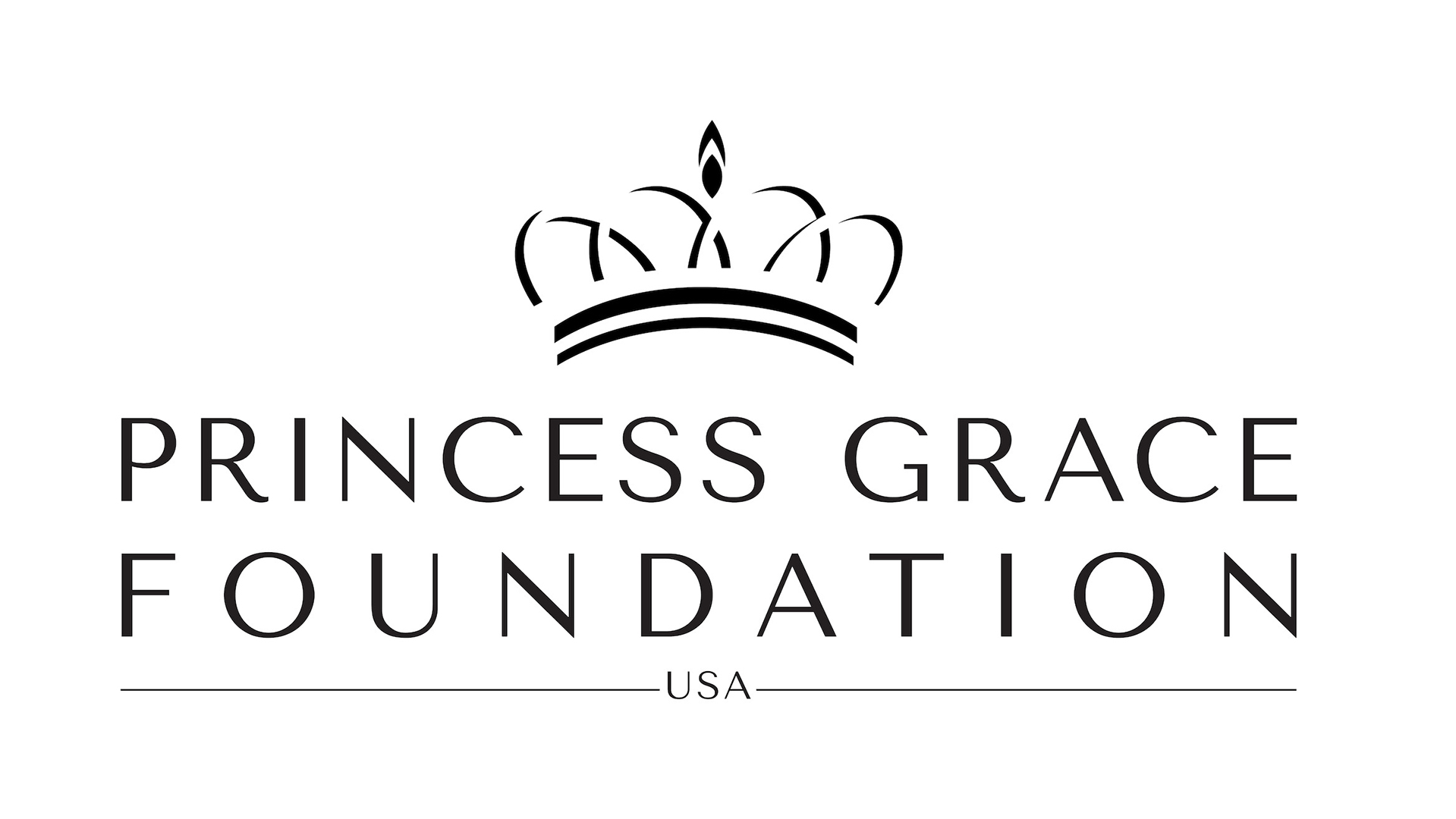
Princess Grace Foundation
On August 6, 2024, the Princess Grace Foundation announced the recipients for the 2024 Princess Grace Awards. Founded in memory of actor Grace Kelly, Princess of Monaco, PGF has been celebrating and supporting budding artists in film, dance and theater for 40 years.
As part of the Princess Grace Foundation’s 40th anniversary celebrating emerging artists in theater, dance and film, recipients have been named within 4 prestigious award programs: Princess Grace Award, Special Project Grant, Grace Kelly Scholarship and the re-introduction of the Princess Grace Statue Award.
Congratulations to the 4 Tisch alumni who received an award or honoraria! See below for the recipients, and click here for the full list.
Branden Jacobs-Jenkins ‘07 (MA, Performance Studies)
Princess Grace Statue Award
Branden Jacobs-Jenkins is a Brooklyn-based writer. His plays include Appropriate, The Comeuppance, Everybody, Gloria, An Octoroon, and Neighbors. He currently teaches at Yale University and serves as Vice President of the Dramatists Guild council and on the boards of Soho Rep, Park Avenue Armory, the Susan Smith Blackburn Prize, and the Dramatists Guild Foundation. Recent Honors include a 2024 Tony Award, the 2023 Lucille Lortel Award for Outstanding Play, a USA Artists fellowship, a Guggenheim fellowship, the MacArthur fellowship, the Windham-Campbell Prize for Drama, and the inaugural Tennessee Williams Award.
Dahlak Brathwaite ‘21 (MFA, Graduate Musical Theatre Writing)
Theater Award
Dahlak Brathwaite is an award-winning dramatic auteur: playwright, composer, director, filmmaker, and performer. His work has been presented at BAM, The Kennedy Center, The Apollo, The Wallis, REDCAT, MCA Chicago, and on HBO’s last two seasons of Russell Simmons Presents Def Poetry. He adapted the acclaimed novel Long Way Down into a musical, which recently premiered at The Olney Theater in Maryland. His latest work COMMERCIAL has been developed and presented at the Public Theater. Dahlak has received awards and support from NEFA, the Doris Duke Foundation, The U.S. State Department, and MAP Fund. He is a graduate of NYU’s Graduate Musical Theatre Writing Program, where he was awarded the Dean’s Full-Tuition Fellowship, and served as the Assistant Director for the national tour of the Tony-winning revival of Oklahoma!
Sim Carpenter (MFA Candidate, Design For Stage & Film)
Theater Honoraria
Simean “Sim” Carpenter is an award-winning, African-American scenic, lighting and production designer from Baltimore, MD. Sim holds a deep passion for social equality. His goal as a designer is to use his many mediums to captivate the audience and reveal the too often disregarded stories of marginalized groups. Selected credits: Long Way Down (Olney Theatre/Apollo Theater); Tiny Beautiful Things (Baltimore Center Stage); The Folks at Home (Baltimore Center Stage); Don’t Let the Pigeon Drive the Bus (Marriott Theatre); D.R.E.A.D. (New York University); FLEX (New York University) Sim holds a B.F.A. in Stage Design from DePaul University and is currently pursuing an M.F.A. in Design for Stage & Film from NYU Tisch School of the Arts.
Gustavo René Sanabria (MFA Candidate, Grad Film)
Film & Animation Award
Gustavo René Sanabria is a Paraguayan-American filmmaker pursuing an MFA in Film & TV at NYU Tisch. His short films have screened at festivals around the world including Sundance, Slamdance, and SXSW, having won numerous awards and received Academy Award qualifications. As a writer-director, he is inspired by the diasporic experience and the decolonization of cinema. His latest film, SIESTA , just had its World Premiere at the Champs-Élysées Film Festival in Paris and is headed to the Edinburgh International Film Festival. Most recently, he has received the 2024 Black Family Prize for his thesis film at NYU. Gustavo develops deeply personal projects in hopes of spurring conversation, thoughts, dreams, and above all, connection.
*We apologize for any errors or omissions. Please send edits or additions to [email protected].

Category: Method
Natalia andrievskikh – speculative 3d designs in expository writing.
Professor Natalia Andrievskikh, Clinical Assistant Professor teaches international writing workshops in the Expository Writing Program (EWP). In an aim to further increase engagement for STEM students enrolled at Tandon School of Engineering, an assignment was developed that probed students to craft a speculative design proposal for an (imagined) object that would serve as a critique of a social problem of students’ choice.
To accomplish the assignment, students needed to identify, research, and reflect upon a “real life” problem of their choice (ranging from pollution, to racism, to digital surveillance) and use 3D design tools to propose a provocative artifact that would illuminate and critique this problem. Rather than presenting a “solution,” the proposed artifacts aimed to serve as a provocation, an invitation to think critically and challenge the unwritten assumptions behind the mainstream design of our public spaces and material objects. The final project consisted of a written research-based component (a research narrative and a design proposal) and a visual prototype of the proposed artifact. Demonstrated technological proficiency was not be the main basis for grading; instead, the project emphasized technology use as an alternative mode of critical thinking and engagement with the material. The assignment focus is inspired by and in part adapted from work by James Malazita at Rensselaer Polytechnic Institute.
Learning Objectives
- I dentify, research, and represent to an outside audience a significant socio-cultural problem of students’ choice
- Demonstrate audience awareness by using appropriate rhetorical strategies to achieve desired emotional and intellectual effects
- Practice critical thinking skills using a hands-on critical making approach
- Experience designing a multimodal artifact that functions as a call for action
- Practice the professional writing genre of proposal to pitch an idea
Student Experience
Here are a few examples of student projects.
CONTROL (Continual Overhead Nearby Tracking Remote Obedience Lookout)
A product designed to exaggerate and thus make visible the problem of surveillance and loss of privacy in the world of modern technologies.
Excerpt from student’s research narrative:
“On the head of the user, there is a headset placed with a lock-type structure on the head. The user is forced to keep the headset on, which represents the feeling of imprisonment as a result of surveillance. On the front of the goggles, there are prison bars which signify how the user is no longer in control of their life. Inside the headset, there is a screen which broadcasts the 3rd person surveillance POV back to the individual and is essentially the only thing that the user can view. The video feed itself showcases that the video and sound is active and the individuals in control of the surveillance can see the position of the target and the remaining battery life of the drone.
3D model of CONTROL
(click and drag to rotate and the 3D design)
Image description: 3D model featuring a figure with a headset that is locked into place. This headset is connected to a drone which is surveilling the figure.
The Uncomfortable Gaming Chair by Haesung Lee
The Uncomfortable Gaming Chair uses counter-intuitive design that would prevent a user from sitting down for prolonged periods of time. The product calls for more awareness of the adverse effects of sitting on the body, a problem especially relevant for those with gaming addiction.
“My plan is to create a gaming chair designed to be uncomfortable. This chair will highlight the problems of prolonged sitting. People who play games are often obsessed with creating an ideal “gaming setup,” so gaming chairs are usually designed to make you comfortable. As a result, the user will likely be sitting all day and gain weight. No matter how comfortable the chair is, sitting for so long will cause health problems. On the contrary, my proposed design would highlight the negative physical effects of sitting on a human body.”
3D model of The Uncomfortable Gaming Chair
Image description: 3D model of a lounge chair that is tilted back with spikes on the seat and a cupholder in an impractical location.
Plastic Straw Eating Sea Turtle by Raisa Islam
Plastic Straw Eating Sea Turtle aims to raise awareness about the effects of plastic pollution on ocean animals. The design relies on shock value to make users consider their role in exacerbating the problem.
“This project aims to renew that shock value one would have felt seeing one of those famous plastic pollution posters for the first time. The prototype features a leatherback sea turtle toy that will be able to be fed and the “food” will be collected in an opening within the turtle toy. The design will mimic functions similar to plastic toys children play with. The turtle can be fed with the provided food. In this design, the food will be plastic straws and the turtle will be “fed” through pushing the straw through its nose rather than its mouth. Overtime, the turtle will degrade and eventually cease to function. The turtle can then be opened by turning it on its back and breaking apart the underbelly. This will expose the plastic straws that it has been fed and that caused the toy to break. The disturbing factor is further highlighted due to not only how this item deviates from the children’s toy it would appear to be, but also how the users are the ones feeding the turtles themselves.”
3D model of Plastic Straw Eating Sea Turtle
Image description: 3D models of a turtle with a finger inserting plastic straws into the turtle’s mouth, and of the open belly of the turtle that shows all inserted plastic straws
Technology Resources
Students were required to sign up for a free account on TinkerCad and to procure the foundational 3D objects for their projects. While students were welcome to search wherever they would like to find their 3D objects, they were advised to first search community-based repositories where no login was required and/or all 3D objects fell under a Creative Commons (CC) license. These websites included Thingiverse and Free3D .
The creation of multimodal project was not an end goal, but a tool to enable productive – and playful – engagement with technology for critical thinking purposes. Compared to “regular,” text-based assignments, the CAD (computer assisted design) format serves to further foreground students’ audience awareness and prompts reflection by necessitating verbal explanation of visual representations of ideas. The multimodal aspect of the assignment provides a more accessible, less rigid learning environment for diverse learners, including English language learners and neurodiverse students. By offering alternative – not language-based – ways of constructing meaning, assignments focused on visualization appeal to students who might self-identify as not “good writers” (as STEM students often do). At the same time, the assignment allows students to practice writing-focused skills such as rhetorical awareness, relaying results of research, and developing a persuasive argument. Last, but not least, technology facilitates creative, out-of-the box approach and enhances students’ intellectual engagement with the content.

Esther Truzman – Asynchronous Fridays
Professor Ether Truzman, Senior Language Lecturer and Course Coordinator teaches intensive Spanish language courses. These intensive courses involve covering two semesters of instruction in just one. As such, they meet 5 days a week and cover the entirety of a textbook in a relatively short time span. In a fully online format, this compressed timeline can quickly result in significant Zoom fatigue with students needing to sign and engage during all 5 days each and every week. In an effort to simultaneously reduce Zoom fatigue and allow students to navigate content at their own pace, the instructor adapted a template to implement Asynchronous Fridays into her courses, initially SPAN UA 10 and then into both SPAN UA 10 and SPAN UA 20 the following semester.
This template was provided during a CUNY online teaching workshop run by the University of Hawaii courtesy of Stephen L. Tschudi, a Specialist in Technology for Language Education. This institution had been offering full remote synchronous, asynchronous, and hybrid courses since before the pandemic. To focus on language learning skills, the central tool employed during Asynchronous Fridays is the video-based asynchronous discussion tool, Flipgrid .
- Allow students the opportunity to asynchronously practice language speaking, listening, reading, and writing skills
- Enable students to pace themselves and provide more student-driven flexibility as they navigate course materials
Here is an example of one specific Asynchronous Friday . Students would have the opportunity to pick and choose which learning exercises they would like to complete that day.
SPAN10 2021S Asynchronous Feb 12
This Friday you must earn at least 10 points using activities chosen from this menu. You will hand in your products in one document (with links as appropriate) BY 6 pm on FEB 12. You MUST choose ONE and ONLY ONE activity in Column A (5 pts.) *It is strongly suggested that you complete Actividad 4.12 in Column B (3 pts.)
| (you can only use ONE of these)
| ||
| With a classmate, make a video recording of a Zoom call in which you perform You will take turns asking and answering questions about the drawing using the verb and as many different prepositions of place as you can. The video earns points for
| Complete , . Write your answers out using full sentences.
| Answer all the questions below under the title .
|
| With a classmate, make a video recording of a Zoom call in which you perform You will take turns asking and answering where the given objects are using the verb and prepositions of place (p. 115). The video earns points for
| Complete , copied below. The instructions are slightly different than in the textbook.
| Complete below
|
| Make a video in which you show us a room in your house (or in a picture) and point out where are using the verb and at least 4 different prepositions of place (p. 115). Alternately, you can show , either in your house or on a floor plan, naming them, and mentioning you do in each room and at least in each room, (from the vocabulary on p. 122). Must be about 1-2 minutes long and have a minimum of 50 words.
| Write a paragraph between 6-8 sentences long in which you describe your favorite room. What is it like? What furniture does it have? Why is it your favorite room? Where is it in your house?
| Complete copied below. Indicate whether the information in the sentences is logical or not. Write “ ” for logical sentences. If the information is not logical, write “ ” and rewrite the full sentence in such a way that it is logical.
|
Here are two students engaging in conversation. This brief conversation was recorded and uploaded using Flipgrid.
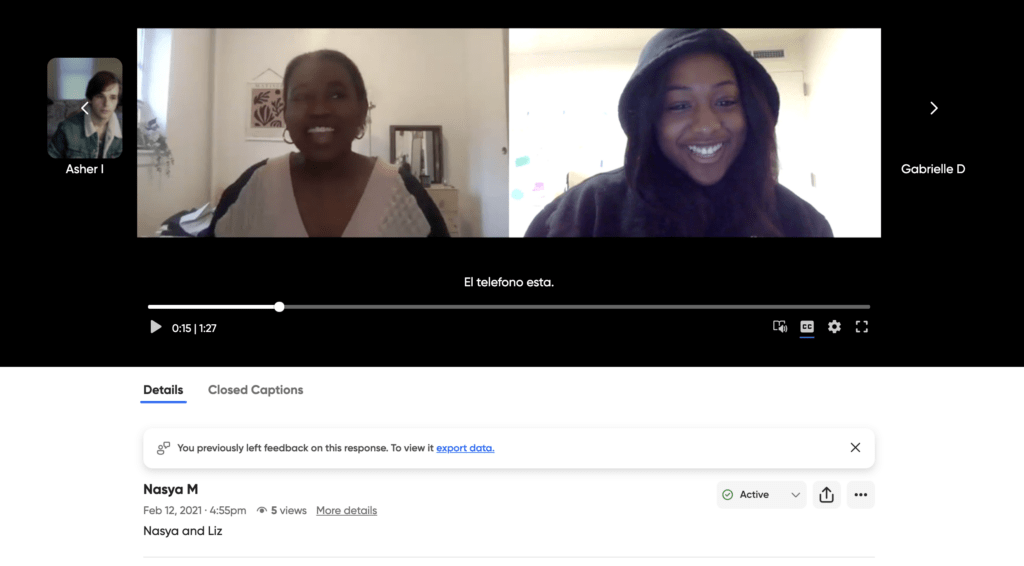
Flipgrid was the primary tool used in Asynchronous Fridays. Students were encouraged to record videos of themselves, but they were also permitted to just record audio submissions. Flipgrid provided the instructor with the opportunity to hear everyone speak, which usually isn’t possible during the synchronous Zoom sessions. The FAS Office of EdTech Flipgrid guide can be found here .
Both the instructor and students in SPAN-UA 10 and SPAN-UA 20 responded well to the integration of Asynchronous Fridays. Students completed the work well and were provided with the flexibility to complete the work at their own pace. The instructor had the opportunity to assess how each and every student was progressing with their language speaking, listening, reading, and/or writing skills.

Courant Institute of Mathematical Sciences – Moving Grader Orientation Online
The FAS Office of Educational Technology collaborated with Courant Mathematics and NYU’s Learning and Organizational Development team to design, develop, and produce a training module for the Courant Institute of Mathematical Sciences graders.
FAS Ed Tech created illustrative graphics, custom animations, and custom branching logic that allowed graders from four different course assignments (and any combination thereof) to use the same module for training, greatly streamlining the enrollment process.
Previously, graders attended their training in-person, which complicated the process of hiring additional and/or replacement graders, as well as preventing assessment of training impact. Moving grader training online allows Courant to provide grader training as needed through iLearn enrollments. Further, the module reports all results to the iLearn system, which can automatically confirm whether a grader successfully completes the training, as well as notify administration.
Additionally, Courant now has the opportunity to build upon the successes of the first iteration to include additional activities, content, and reporting features, using both data and learner feedback to guide future iterations.
- Develop online module to train Courant Mathematics graders in the following topics: grader roles, responsibilities, grading best practices, legal implications
- Algebra and Calculus
- Calculus/MFE I-III
- Discrete Mathematics/Upper-Level Courses
- Linear Algebra
- Ensure accurate reporting, compatibility with NYU iLearn platform
- Accessibility-compliant content: screen reader compatibility, speech-text for math examples
Courant Mathematics successfully implemented the training module (hosted on iLearn) for the Fall 2019 semester, and will require all graders to successfully complete training before hiring. Courant will be gathering feedback from this first iteration to inform changes and enhancements for the next version of the training. Results have been positive with faculty experiencing significantly fewer complaints and regrade requests from students.
“I found the orientation pretty helpful. It helped me understand the basic difference between algebraic and conceptual errors related to integration. And since it is online, it gave me a lot of flexibility time-wise. Also, since it is not too long, it’s easy to follow.” Grader Trainee
- Adobe Captivate + MathMagic (module authoring, math notation rendering)
- Adobe Creative Cloud (graphics and animations)
- VideoScribe (animation software)
- NYU Classes + SCORM Cloud (for hosting review drafts)

Susanna Horng – Creative Cartography: The City as Site of Cultural Production
Professor Susanna Horng (Liberal Studies) uses project based learning to guide her first-year Writing II students in the creation of digital maps. Students are asked to research and design an unwritten chapter for one of the following course texts: Maps of the Imagination: The Writer as Cartographe r by Peter Turchi, or Nonstop Metropolis: A New York City Atlas edited by Rebecca Solnit & Joshua Jelly-Schapiro. Students use ESRI Story Maps software to create interactive, city-based narratives/digital humanities projects, which interrogate the urban and visualize what it means to be a Global Citizen.
- Creative cartography offers multi-modal methods of synthesizing research, narrative mapping, analysis of sources, and data visualization.
- These activities allow students to flex multimedia and presentation skills. Image, video, and sound selection creates meaning or supports text.
- The project engages students’ critical thinking, time management, and executive functioning skills.
- This practice hones students’ digital literacy.
First-year Writing II students are asked to create layered maps with images, videos, hyperlinks links, QR codes, and lyric essays. After instructor contacts Data Services , students are sent email invitations for NYU institutional ArcGIS accounts. Students then create free ESRI Story Maps accounts using NYU Institutional ArcGIS Account. The instructor then creates a private ArcGIS Group for class so students share projects with classmates only. To develop their projects, students work with large amounts of data, longitude and latitude coordinates, and create Excel/Google spreadsheets as research tools.
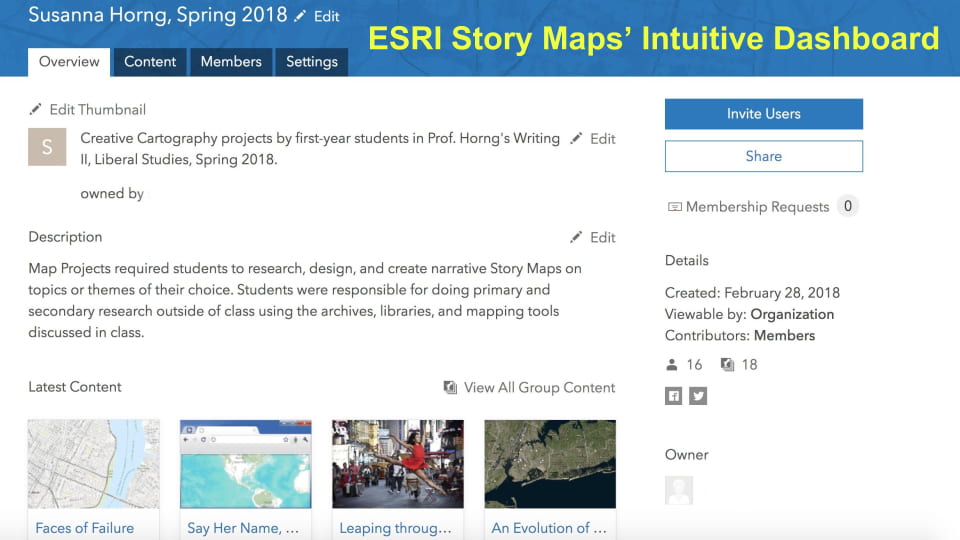
- Data is stored in Google Sheets or Microsoft Excel spreadsheets
- Uses ArcGIS (Geographic Information Software) to integrate maps with text, images, videos, hyperlinks, and sound.
- Free NYU Institutional Accounts through Data Services
- Digital Studio, Bobst 5th floor
- Students will synthesize research, analysis of sources, narrative mapping, and data visualization through the practice of creative cartography using Story Maps software.
- Students will create an effective presentation and create meaning through multimedia: image, video, and sound.
- Students will apply digital literacy, critical thinking, time management, and effective functioning skills.
Chen Gao – Learning to Write Chinese with a Social Network
Professor Chen Gao (East Asian Studies) used WeChat, a social networking app popular in China, with students in the EAST-UA 205 Advanced Chinese I class. The use of WeChat extended the learning community beyond the classroom to include native speakers and users of the app.
Each week of the semester, Professor Gao selected 1-3 samples of student writing (daily responses to classroom readings) to share in WeChat’s official “四海八荒青年说 (World Youth Forum).” Students were then asked to provide constructive feedback to their peers’ posts, while the published students were asked to respond in kind. By the end of the semester, students were also engaging in conversation with native Chinese speakers on WeChat.
At the end of the semester, Professor Gao produced a student journal comprised of the WeChat posts; each student received a physical copy.
- Build a virtual learning community to facilitate collective and immersive language learning.
- Promote students’ interest in writing and build their awareness both as a reader and a writer.
- Provide level-appropriate reading for students.
- Connect students with a cultural social-networking experience.
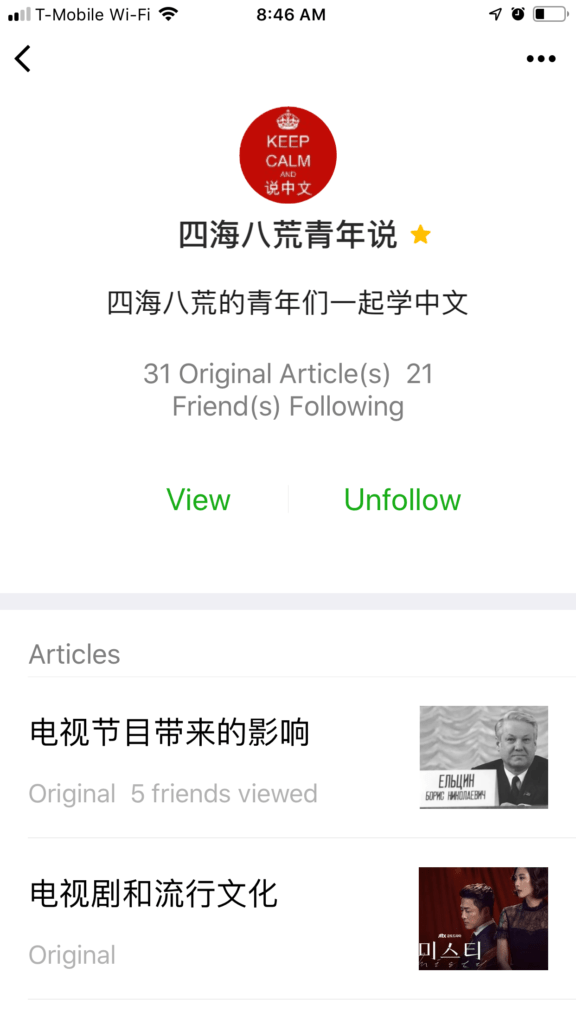
This project required students to:
- Submit their daily writing assignments related to classroom readings
- Read their peers’ posts on WeChat every week
- Leave comments on peers’ writing and provide constructive feedback
- Respond to comments on their own writing
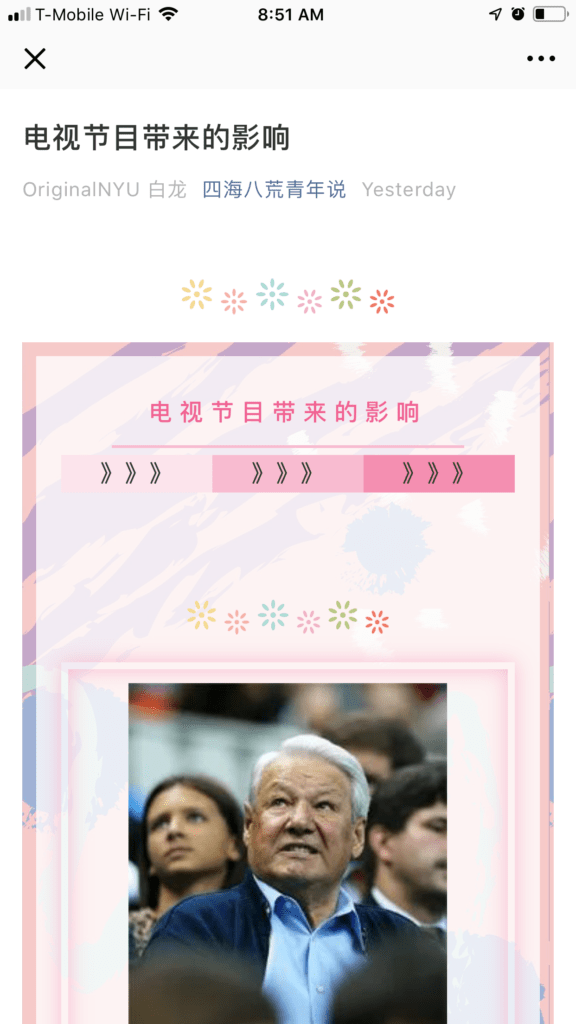
Students accessed WeChat via their personal mobile devices.

Reflecting on the project Professor Gao says, “This activity helped increase students’ reading and writing proficiency. WeChat provided more opportunities for students to engage in meaningful language output in a stress-free learning environment. It helped students develop awareness as a reader and a writer. Students not only had to consider how their words might be received by their teacher, but also by the wider audience of readers who will see their work when it is published online. When they adapted their literacy learning to new contexts, with a new audience of readers, they became more aware of that learning and its potential uses. Students became more independent learners when they knew how to articulate and demonstrate what they were aware of and what they needed to work on further.
The WeChat project encouraged collaborative learning. Students could learn from and with each other. Also, because during the project, I closely monitored the participation of all students, gave feedback and corrected their grammar errors in their writing on WeChat, it also increased teacher contact time and strengthened teacher-student relationship.”
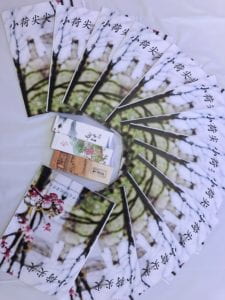
Selected Student Feedback:
“I liked that it was a different way to learn!”
“It allowed me to view other peer’s writing that was close to my own level.”
“Reading classmates’ posts helped me in reviewing the content of the lessons.”

Getting Students ‘Back on Track’ – Interactive Online Modules for CAS Academic Advising
Updated on 9/23/19
FAS Ed Tech assisted CAS Advising in developing interactive modules for an online course of study to help students on academic probation improve academic performance. Students complete modules prior to meetings with advisors, building skills and knowledge in four key areas: goals and goal setting, time management, learning strategies, and aligning interests, careers and majors.
- Develop original static presentations into enhanced interactive online versions
- Goals and Goal Setting Module: learners develop strategies for writing effective goals, and create an action plan. Interactive tools are provided for building self-motivation, including how to develop self-efficacy and a growth mindset.
- Time Management Module: learners can input a week’s list of activities and practice prioritizing them using a drag and drop interaction
- Interests, Careers, and Majors Module: extensive branching functionality enables learners to match programs of study that align with their interests
- Track learner progress and input for follow up meetings with advisor
CAS Advising has been offering the Back on Track modules to over 50 academic probationary students per semester since Spring 2017. Students complete reflective assignments, connecting module content and activities to their personal experience. Learners are able to consider many factors affecting their academic performance as well as strategies for improvement in advance of meeting with their advisors. Early data is demonstrating both a decrease in course withdrawals and an increase in GPA for these learners, and the Back on Track program has been featured in an article on Academic Advising Today .
The FAS Office of Ed Tech is currently working with CAS Advising to revise the modules with updated content, and accessibility and data-reporting enhancements. The future goal is to develop versions of the content for the broader NYU community.
- Adobe Captivate
- Adobe Creative Cloud
- Articulate Storyline
- NYU Classes
- SCORM Cloud
Example Module: Motivation and Goal Setting
Click on the link to view the Motivation and Goal Setting Module .

Adam Penenberg – Journalism Foundations Online Course Site
FAS Ed Tech connected Journalism Professor Adam Penenberg with the Central IT Instructional Design Team to develop an online course site focused on basic journalistic principles for incoming students. Utilizing content Professor Penenberg had originally created in Google docs, FAS Ed Tech and the Central IT team developed a comprehensive course of study in NYU Classes, which students can complete prior to beginning their face-to-face courses.
- Consult with instructor on best practices for online instruction
- Identify design issues adapting Google Docs content for Classes tools
- Leverage NYU Classes tools to provide asynchronous instruction in journalistic foundations
- Build NYU Classes course site incorporating instructor’s existing content with affordances of Classes tools
- Include formative assessment to improve iterations of the course
- Google Docs
These introductory modules have been offered to entering Journalism students since the summer of 2017. In addition to providing basic information in journalistic law, ethics, history, and grammar, instructors can view analytics regarding the multiple assessments throughout the content, and identify areas to address with their students. Students begin their classes with a stronger background in foundational knowledge.

Michael Beckerman – Musical Geographies of Dvorak’s New York
FAS Ed Tech worked closely with FAS Music Professor Michael Beckerman on a collaborative class project for his Freshman Seminar class. Students learned to use Geographical Information Systems (GIS) technology as both a research and narrative tool, demonstrating connections among New York City’s history, geography, and architecture, and connecting these with Dvořák’s impact on and experience with American music culture during his time spent in the city (1892-1895). Students used the Fulcrum app on their mobile devices to explore and collect information from locations around the city significant to Dvořák’s time. While developing their “story map” students investigated several different threads that emerged from the initial data captured via the Fulcrum app.
- Assist Professor Beckerman and students in a project combining location data, multimedia, and historical reSearch
- Determine, in collaboration with instructor and students, appropriate tools for location-based research and media collection for student projects
- Partner with NYU Library Data Services to provide access and training to GIS tools (Fulcrum, ESRI)
- Facilitate management of student-generated data collections and provide technical assistance importing Fulcrum data into ESRI Story Maps
Combining location data, multimedia, and historical information, Professor Beckerman’s students used both CARTO and ESRI Story Maps to create interactive, GIS-focused presentations describing Dvořák’s influence on NYC and American music cultures, as well as America’s musical influence on Dvořák.
- Fulcrum mobile app
- ESRI Story Maps

Gabriela Nik Ilieva – Web Publishing for Language Instruction – Virtual Hindi, Virtual Urdu, Virtual Bhangra
After learning about NYU’s Web Publishing service from attending the FAS Innovation in Language Teaching Workshop, Professor Gabriela Nik Ilieva decided to use the NYU Web Publishing platform (WordPress) for her project building websites for collecting, organizing, and sharing instructional materials for Hindi, Urdu, and Bhangra; languages that are underrepresented with respect to open educational resources. In consultation with FAS Ed Tech, Professor Ilieva built several WordPress sites dedicated to Hindi, Urdu, and Bhangra language resources.
- Identify appropriate platform for instructional website (WordPress vs. Google Sites)
- Strategize with faculty on site structure and design
- Train faculty on WordPress site building and administration
- Advise on content migration from old website(s)
Professor Ilieva now has online spaces where she can more easily collect, develop, and share teaching resources, and can leverage WordPress’ easy to use customizability and extensibility through various widgets and plugins. Professor Ilieva has future plans to incorporate additional interactive content into her sites, as well as design separate areas for instructors and students. In addition, she is interested in collaborating with teachers and learners beyond the NYU community, and is looking into further development of her sites’ functionality.
- NYU Web Publishing (WordPress)
- Google Drive

Liberal Studies Faculty – Life Science Online Modules
FAS Ed Tech partnered with Liberal Studies Life Science professors Lori Nicholas and Kevin Bonney to develop interactive content modules for use in both their face-to-face and online courses (LS launched a pilot online course in Life Science for the Summer 2017 semester). Each module presents course content through accessible, interactive multimedia presentations that also test students on their knowledge and understanding of the material.
- Produce interactive content modules for 12 units of study based on instructor-developed PowerPoint presentations
- Record voice-over narration and generate transcripts for accessibility
- Incorporate assessments for learners to check knowledge and basic understanding of concepts
These modules have been an important part of the Life Science course through several semesters. Students in the face-to-face courses have been able to review content prior to coming to class and can utilize class time to ask questions, clarify misconceptions, and dive deeper into the material. During class, the instructor can spend more time on the active application of concepts and further exploration of the topics.
- MS PowerPoint
Example Module: Introduction to the Immune System
- Nizhny Novgorod Tourism
- Nizhny Novgorod Hotels
- Nizhny Novgorod Guest House
- Nizhny Novgorod Flights
- Nizhny Novgorod Restaurants
- Nizhny Novgorod Attractions
- Nizhny Novgorod Travel Forum
- Nizhny Novgorod Photos
- Nizhny Novgorod Map
- All Nizhny Novgorod Hotels
- Nizhny Novgorod Hotel Deals
Planning to go to Nizhny Novgorod - Nizhny Novgorod Forum
- Europe
- Russia
- Volga District
- Nizhny Novgorod Oblast
- Nizhny Novgorod
Nizhny Novgorod Hotels and Places to Stay
- GreenLeaders
Religious Sites in Nizhny Novgorod Oblast, Russia
Religious sites in nizhny novgorod oblast.
- Architectural Buildings
- Churches & Cathedrals
- Monuments & Statues
- Points of Interest & Landmarks
- Sacred & Religious Sites
- 5.0 of 5 bubbles
- 4.0 of 5 bubbles & up
- 3.0 of 5 bubbles & up
- Good for Kids
- Good for a Rainy Day
- Budget-friendly
- Good for Big Groups
- Good for Adrenaline Seekers
- Honeymoon spot
- Adventurous
- Hidden Gems
- Good for Couples
- Things to do ranked using Tripadvisor data including reviews, ratings, number of page views, and user location.

1. Saint Seraphim-Diveyevo Monastery
2. Sacred Spring of Serafim Sarovskiy

3. Queen of Heaven's Holy Trench
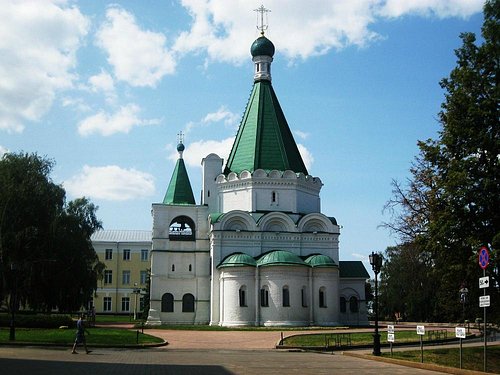
4. Michael the Archangel Cathedral

5. Spaso-Staroyarmarochny Cathedral

6. Spring of Saint Panteleimon

7. Annunciation Monastery

8. The Temple in Honor of the Assumption of the Blessed Virgin Mary

9. Sarov Underground Complex

10. Makaryev Monastery
11. Gorodetskiy Feodorovskiy Monastery

12. Saint Trinity Ostrovoezersk Monastery

13. Royal Skete

14. Holy Assumption Florischeva Pustyn

15. Church of the Annunciation of the Blessed Virgin

16. Kazan Spring

17. Bell-tower

18. Vyksa Iversky Women's Monastery

19. Spring of Blessed Alexandra of Diveyevo

20. Soborny Bell

21. Chapel of St. Nicholas

22. Chapel of the Archangel Michael

23. Chapel Dedicated To St. Alexander Nevskiy

24. Church of the Intercession of the Mother of God

25. Bell Tower of Holy Trinity Monastery

26. Chapel In Honor Of The Image Of The Savior Not Made By Hands
27. chapel of st. nicholas.

28. Transfiguration Monastery of the Savior

29. Bell Tower of the Transfiguration Cathedral

30. Oranskiy Bogoroditskiy Monastery
What travelers are saying.


IMAGES
COMMENTS
Summer Programs Writers in Florence Writers in New York Writers in Paris ... The NYU Creative Writing Program. is among the most distinguished programs in the country and is a leading national center for the study of writing and literature.
The NYU Vocal Performance major is training to be an opera singer, but in Florence, she found that "writing my own stories instead of performing stories written by others was a refreshing experience.". In fact, Katherine spent the past summer completing a Creative Writing minor by enrolling in both Writers in Florence and Writers in Paris.
The Creative Writing Program offers Intro to Prose & Poetry workshops throughout the summer. Classes are held on NYU's Greenwich Village campus. Coursework ranges from an introduction to the fundamentals of the craft to more advanced explorations of specific forms, techniques, and genres. Workshops are open to NYU and non-NYU students.
For NYU English Majors in the Creative Writing Track, Writers in New York fulfills the Creative Writing requirement for two successive Creative Writing workshops. From recent students: "Writers in New York was a really great step forward for my writing." "The Writers in New York program was the perfect introduction to the literary past and ...
Creative Writing (2022 - 2024) In addition to the on-campus creative writing courses offered throughout the year, special January term and summer programs offer students a chance to study intensively and generate new writing in Florence, New York, and Paris. CRWRI-UA 815 Formerly Creative Writing: Introduction to Fiction and Poetry.
Please direct all inquiries to [email protected]. Our summer writing workshops are open to NYU and visiting students, and are held in various locations on NYU's Greenwich Village campus. NYU students may register for the summer term via Albert starting in Spring 2024. NYU students will earn 4 credits toward the Creative Writing Minor.
In this intensive 4-week program, you will focus on poetry, fiction, or creative nonfiction as you participate in daily writing workshops and craft sessions. Your experience is enhanced by special events, including readings, craft talks, and panels with acclaimed authors and publishing professionals. Summer at NYU Tisch School of the Arts
as.nyu.edu/cwp Lillian Vernon Creative Writers House, 58 West 10th Street, New York, NY 10011-8702 • 212-998-8816. Director. Professor Landau. The New York University Program in Creative Writing, among the most distinguished programs in the country, is a leading national center for the study of writing and literature.
Creative Writing. This summer, immerse yourself in the craft of creative writing with fellow young authors in a pre-college environment. Learn from an industry expert as you transform your ideas and stories into compelling writing. Develop the techniques that are fundamental to all types of fiction writing—literary fiction, dystopian ...
Writers in New York: Program Dates & Cost Information. 2024 Dates. Program Dates: May 28-June 21. Orientation & First Day of Classes: May 28. Last Day of Classes: June 21. 2024 Schedule. All students are in class four days per week, in two classes in their chosen genre (fiction, poetry, or creative nonfiction)—a Craft Seminar and a Writing ...
Writers in Paris (May 24, 2024 - June 22, 2024) students choose to focus on poetry, fiction, or creative nonfiction, and attend daily writing workshops, craft seminars, and literary readings and events. Writing and reading assignments are designed to encourage immersion in the city. For example, poets might visit the Louvre to write ekphrastic ...
Each intensive program is four weeks and awards eight points of credit. In addition to these summer programs, we offer three-week workshops during the January Term and several on-campus summer workshops during both of NYU's six-week summer sessions. The Undergraduate Creative Writing Program also has a strong presence outside of the classroom.
A creative writing sample is required. It should not exceed 25 double-spaced pages for fiction and nonfiction applicants and 10 single-spaced pages for poetry applicants. The font size should be 12 point or larger. The Graduate School of Arts and Science reserves the right to change this information at any time.
Students wishing to begin the creative writing minor while studying away at an NYU site should register for Creative Writing (CRWRI-UA 9815) or, if studying away in the summer, for one of the 8-point intensives offered in Paris and Florence (CRWRI-UA 9818, 9819, 9828, or 9829).
The New York University Program in Creative Writing, among the most distinguished programs in the country, is a leading national center for the study of writing and literature. ... please contact us at [email protected]. ... However, students who begin their minor by taking one of the program's 8-credit summer intensives—Writers in New ...
Six-credit Dramatic Writing program for high school students through NYU Tisch. Students develop scripts and learn the basics of screenwriting and playwriting. ... Build your creative skillset with an online course or join us in New York City. More. Study Abroad. ... Students accepted to the Tisch Summer High School program live in NYU housing ...
This summer, the NYU Creative Writing Program will offer three 4-week summer program opportunities: Writers in Paris, Writers in New York, and Writers in Florence. Our programs are open to all NYU undergraduates as well as visiting undergraduate students. Information about these programs can be found below.
25 New Chardon Street, #8722. Boston, MA 02114. [email protected]. TeenLife provides a directory of enrichment programs for students in grade 7-12, along with regular content to support strong teen growth & decision making. TeenLife is passionate about teen success.
Ocean Vuong, an award-winning poet, will join the Faculty of Arts & Science at New York University as a Professor of Creative Writing this fall. Vuong is the author of two collections of poetry—most recently, Time Is a Mother (Penguin Press, 2022)—as well as a New York Times bestselling novel, On Earth We're Briefly Gorgeous (Penguin ...
Dahlak has received awards and support from NEFA, the Doris Duke Foundation, The U.S. State Department, and MAP Fund. He is a graduate of NYU's Graduate Musical Theatre Writing Program, where he was awarded the Dean's Full-Tuition Fellowship, and served as the Assistant Director for the national tour of the Tony-winning revival of Oklahoma!
These introductory modules have been offered to entering Journalism students since the summer of 2017. In addition to providing basic information in journalistic law, ethics, history, and grammar, instructors can view analytics regarding the multiple assessments throughout the content, and identify areas to address with their students.
Skip to main content. Discover
Sign in to get trip updates and message other travelers.. Nizhny Novgorod ; Hotels ; Things to Do ; Restaurants ; Flights ; Vacation Rentals
Nizhny Novgorod Oblast Religious Sites: See reviews and photos of 10 religious sites in Nizhny Novgorod Oblast, Russia on Tripadvisor.
Nizhny Novgorod Oblast (Russian: Нижегоро́дская о́бласть nee-zhyh-gah-ROHT-skuh-yuh OH-bluhst) is a region in the Upper Volga, bordering Ryazan Oblast to the southwest, Vladimir Oblast to the west, Ivanovo Oblast to the northwest, Kostroma Oblast to the north, Kirov Oblast to the northeast, Mari El to the east, Chuvashia to the southeast, and Mordovia to the south.